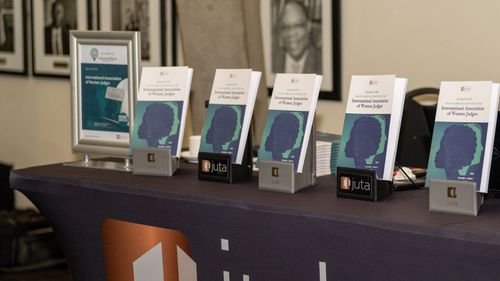- Home
- Products & Services
- About
- Blog
- Faq
- Contact Us
The mission of the South African Law Reform Commission (SALRC) is the continuous reform of all branches of the law of South Africa in accordance with the principles and values of the Constitution to meet the needs of a changing society operating under the rule of law.
As part of their venture to fulfil this mandate and with Juta as a sponsor, the SALRC invites all law students studying towards an LLB or LLM at a South African University to submit their innovative ideas championing law reform issues into the annual South African Law Reform Commission Legal Essay Writing Competition, the 2022 results of which were announced last month at the annual event.
The LLB category winner, “Should Career Assets Be Catered for Upon Divorce? The Case for the Inclusion of Career Assets as Property in a Spouse’s Marital Estate,” by Rhodes scholar Hugh Harnett, considers whether it is appropriate to include career assets in the form of academic and professional qualifications as property upon divorce. To date, South Africa does not do so, but developments in other jurisdictions and progressive perspectives on the nature of property call this position into question.
We spoke to Harnett about his winning submission and the future of law in South Africa.
What was your inspiration for participating in the SALRC-Juta essay writing competition?
The competition is very prestigious, and the feedback from the external examiner of my LLB Research Essay was mostly positive, so I thought I had a chance. The encouragement of my supervisor, Prof Helen Kruuse, was the catalyst that saw me knuckle down and write the essay for the competition.
Your essay focused on a case for the inclusion of career assets as property in a spouse’s marital estate. What was your inspiration for this particular topic?
From the onset, I must admit to having never been married, let alone divorced! My inspiration was viewing career assets through an accountant’s lens (my career before studying towards an LLB). A person’s career assets, their human capital effectively, do have value and can be objectively valued. As an accountant, career assets and their current exclusion from a spouse’s estate were surprising and did not make sense to me.
By way of example: if a person takes the money they would have spent on higher education and invested in rental property to generate their monthly income needs, we would not hesitate to include the value of that rental property in their estate. However, suppose a person takes the same amount of money and invests it in their education. In that case, that will generate the same amount of money in employment income as they would have received in rentals. Suddenly, that income-generating asset (their qualification/earning capacity) is wholly ignored should that person divorce.
In your essay, you note that no significant review of the Matrimonial Property Act has occurred since its inception nearly 40 years ago. Why, in your perspective, is it important to look at the act in the context of South Africa’s society as it is today?
I am what one might politely describe as a “mature student” at 43 years old. Having been born before the MPA came into force, I have lived through the seismic social and political changes that shape today’s modern society. Any legislation, however appropriate for the time it was promulgated, must be monitored to ensure it is still fit for purpose. Relating to career assets, the rise of the “knowledge economy” has seen people’s wealth measured by not only their traditional assets, property, shares and the like but also their capacity to generate income from their human capital, their career assets.
What change or transformation would you like to see in the justice system?
That is a difficult question, considering my relative lack of experience in the legal sphere. Access to justice remains a challenge for many. Regarding the justice system, there has been a transformation, but do we need more? Absolutely.
Can you share some of your personal aspirations around the difference you would like to make in the field of law?
My immediate aspiration is to complete my LLM! Should it in some small way contribute to some form of recognition of career assets upon divorce, I would be thrilled.
Who would you like to acknowledge or thank?
I owe my supervisor Professor Kruuse a debt of gratitude. Not only did she introduce me to the concept of career assets, but her support, guidance and encouragement were invaluable. I must also acknowledge the entire Rhodes Law Faculty staff for their support and guidance during my law studies.
Read the full essay here.

Kagiso Tiso & Kagiso Media Fraud Hotline: 0800 21 25 83


